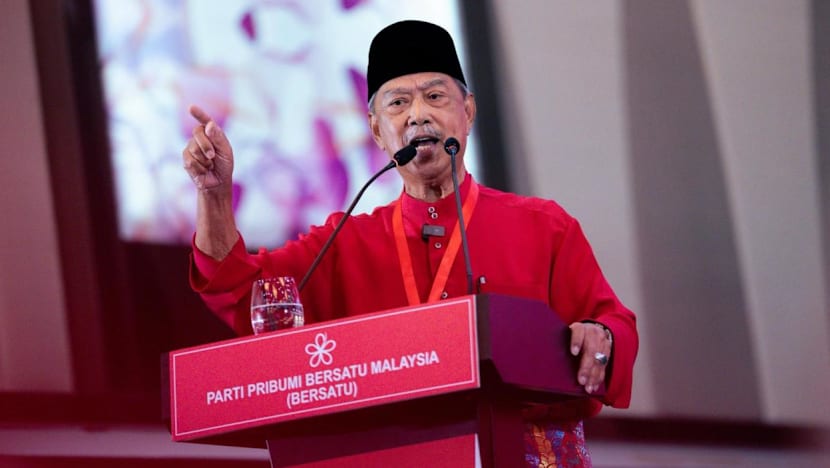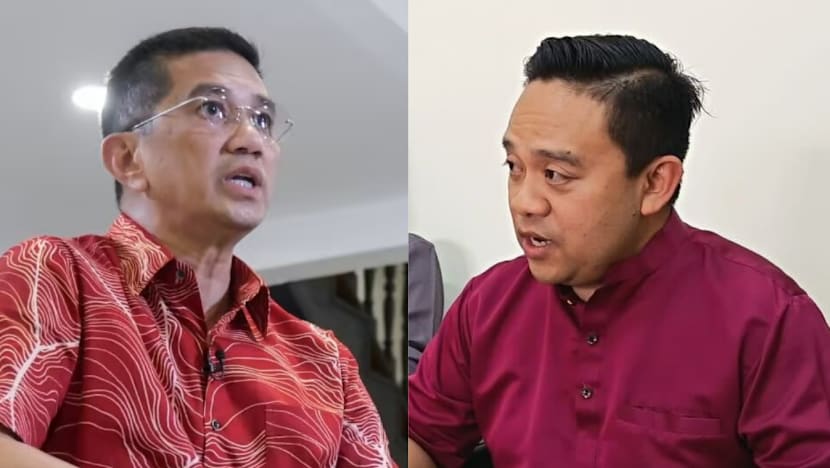Commentary: Malaysian opposition party Bersatu’s lack of discipline has given PAS more control
Bersatu's infighting has weakened it and given conservative coalition partner PAS the upper hand, say these ISEAS-Yusof Ishak Institute researchers.

Parti Pribumi Bersatu Malaysia president Muhyiddin Yassin speaking at the party's annual general meeting held on Sep 6 and 7, 2025 in Shah Alam, Selangor. (Photo: Facebook/Dr Radzi Jidin)
KUALA LUMPUR: All of Malaysia’s major political parties are undergoing factional struggles, including the party that calls itself the “United Party” or Parti Pribumi Bersatu Malaysia (Bersatu).
But two internal spats in Bersatu have put the party in a precarious position. Through its lack of discipline, Bersatu could have surrendered its de facto leadership status in the Perikatan Nasional (PN) coalition to Parti Islam Se-Malaysia (PAS), its bigger and more conservative partner.
At Bersatu’s annual general assembly in early September, a scuffle ensued while its president Muhyiddin Yassin was addressing delegates.
Bersatu’s deputy president, Hamzah Zainudin, was reportedly plotting to overthrow Muhyiddin, a former prime minister. Since the 2022 General Election, Hamzah has projected himself as a strong contender to succeed Muhyiddin, with increased public visibility as leader of the opposition in Parliament.
Hamzah denied being disloyal to Muhyiddin, and affirmed his support for his superior at the end of the meeting. The two leaders seemed to have buried the hatchet until personal attacks were made by Bersatu leaders from both camps against one another.

The latest quarrel was between Wan Saiful Wan Jan, a Member of Parliament for Tasek Gelugor and supreme council member of Bersatu, and Azmin Ali, the party’s secretary general.
On Sep 29, Wan Saiful held a press conference to deny allegations that statutory declarations had been collected to oust Muhyiddin as party president. Instead, he claimed that the signatures were gathered as part of a proposal to avoid discussing sensitive matters at the annual general meeting.
Wan Saiful accused Azmin, who is also seen as among the next generation of Bersatu’s leaders, of spreading the “distorted narrative” that 120 statutory declarations have been gathered to oust Muhyiddin, and that Azmin would prevent disloyal members from running in the next general election.
At the same press conference, Wan Saiful said Azmin was an unfit leader. He dredged up a six-year-old sex video scandal of two men in bed; one of them resembled Azmin. In 2019, the police confirmed that the video was authentic, but they could not establish the identities of the men involved.
BERSATU EXPOSES INTERNAL PROBLEMS
Other political parties in Malaysia have their fair share of public disagreements, including those in the government. Instead of leveraging these splits, however, Bersatu has undermined itself by exposing its internal problems.
Party discipline is loose and needs some tightening if the party intends to win the next election. It was already struggling to win over non-Malay voters; now it may lose its conservative Malay support base.
PAS, which holds more seats in Parliament than Bersatu, appears to favour Hamzah over Muhyiddin. This further highlights the cracks within PN.
Interestingly, Muhyiddin emerged from the annual general meeting as the undisputed leader, with Hamzah declaring support for him publicly. If the party had the discipline, it could have regrouped and ironed out differences internally, or it could have channelled them to disciplinary mechanisms.
Instead, the disputes were raised through the media – this does no good for Bersatu’s image. Wan Saiful’s action is a clear violation of party discipline. To give him the benefit of the doubt, however, he might have felt that party channels were not available for him to air his grievances.
With Wan Saiful’s disclosure, PN core voters may now see Bersatu as being no different from the United Malays National Organisation (UMNO), which has its own internal rivalries.
Unsurprisingly, grassroots voices are growing louder against Wan Saiful. Tasek Gelugor Bersatu chief Azmi Alang is calling for his sacking, alongside similar calls from Bersatu leaders in Selangor and Johor.
For many Malays, the Bersatu and PAS union serves as a counter to UMNO’s system of entrenched patronage. But constant feuds risk alienating Malay voters who value stability and clarity of leadership.
PAS IS GAINING GROUND
Bersatu’s woes may force PAS leaders to reconsider the political union. For PAS, Bersatu has been its avenue to reach out to Malays who are less religiously conservative.
Because it is seen as more inclusivist, PAS members have, for some time, allowed Bersatu, the smaller party in PN, to hold key positions in the coalition without compromising loyalty to PAS president Abdul Hadi Awang. Only time will tell if they have the patience to tolerate Muhyiddin.
PAS can either force Bersatu to commit to a party succession plan acceptable to PAS, or push ahead on its own, since it has consolidated its power base in the East Coast and Northern states in Peninsula Malaysia. If Bersatu replaces Muhyiddin, there is a chance PAS will accept Hamzah as its prime minister candidate, since he is already accepted as the leader of the opposition.
As Bersatu is faltering, PAS is gaining ground. With religious legitimacy and formidable grassroots machinery, PAS does not need to prove that it has party discipline; it already commands it. It will emerge as the dominant Malay party by default.
PAS is already asserting its power: This can be seen in its recent call for a PAS prime minister candidate and its expressed goal of winning 80 seats in the next general election (it won 43 in the 2022 elections).
Although it is unlikely that PAS would be able to capture Putrajaya on its own, the party will likely be the biggest opposition party. It could also become a kingmaker in the event that Malaysia sees another hung parliament.
Muhyiddin must now decide whether Bersatu will be remembered as a vehicle of Malay political renewal or another casualty of infighting and decline. He must seriously consider passing the baton to the next leader.
Syaza Shukri is a Visiting Senior Fellow at ISEAS - Yusof Ishak Institute. She is also an Associate Professor at the Department of Political Science, International Islamic University Malaysia. Norshahril Saat is a Senior Fellow and Coordinator at the Regional Social & Cultural Studies Programme, ISEAS – Yusof Ishak Institute. This commentary first appeared on the ISEAS-Yusof Ishak Institute's blog, Fulcrum.













.jpg?itok=dV4_YDNJ)




